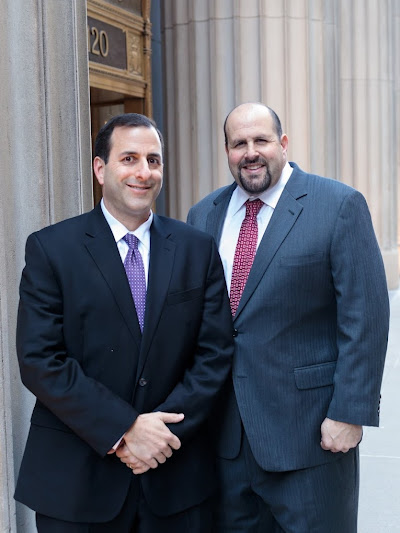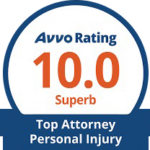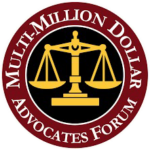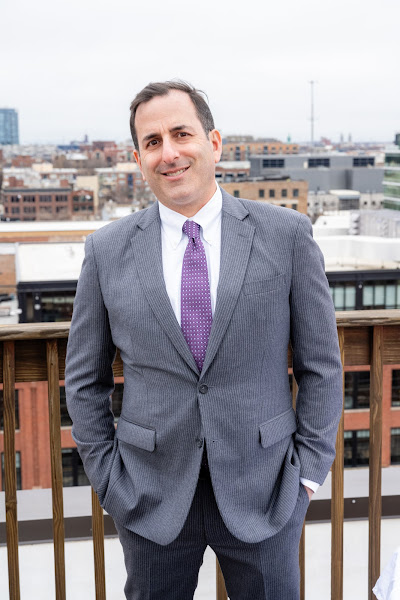If you were injured on a Chicago construction site, you are likely facing pressure from all sides. Your employer and their insurance carrier may be pushing you toward a quick workers' compensation settlement.
But is that all you are entitled to?
In many cases, the answer is no. While you generally cannot sue your direct employer, Illinois law allows you to pursue a separate personal injury claim against other negligent parties who contributed to your injury. This is called a third-party liability claim, and it is often the only path to recovering compensation for the full scope of your losses, including pain and suffering.
A Chicago construction accident lawyer from our firm understands the powerful corporations, overlapping employers, and high stakes involved. We handle the legal work so you can focus on healing.
Call Abels & Annes, P.C. now for a free conversation about your case at (312) 924-7575.
A Firm Built for Complex Injury Claims

When you are recovering from a serious injury, you deserve personal attention from an attorney, not the experience of being just another case file. Our team has years of experience handling serious injury claims in Chicago. We know the challenges you face and are structured to meet them directly. We operate on a contingency fee basis, which in simple terms means you pay us nothing unless and until we win your case.
Our commitment is to be available 24/7 to answer your questions—you can always speak directly to a lawyer. This dedication is reflected in our results, including a $1,475,000 settlement for a worker electrocuted on a job site. Our attorneys are consistently recognized by their peers, with selections to the Illinois Super Lawyers Top 100 List and top ratings on Avvo.
From our main office at 100 N LaSalle St #1710, in the Chicago Loop, we are part of this community and ready to help.
Workers' Comp Claim vs.Third-Party Lawsuit

Many injured workers assume workers' compensation is their only option. It’s an essential first step, providing no-fault benefits for medical care and a portion of your lost wages. However, it is a limited system. It will never cover the full scope of your lost income, and it provides nothing for the pain, suffering, and emotional trauma of the injury.
A third-party liability claim against other negligent parties on the job site is where a full and fair recovery is truly found.
How a Workers' Comp Claim and a Third-Party Lawsuit Work Together
The two cases run on parallel tracks, and managing them correctly is key to your financial recovery.
The Workers' Compensation Lien
Think of the workers' compensation benefits you receive as an advance. The insurance carrier that pays for your initial medical bills and lost wages has a legal right to be paid back from the money you recover in your separate, third-party lawsuit. This is called a workers' compensation lien. It ensures you don't get "paid twice" for the same medical bill.
Why a Third-Party Case is Still Worth It

You might ask, "If I have to pay the money back, what's the point?" The answer is simple: the third-party claim pays for all the things workers' comp ignores.
Your third-party lawsuit is the only way to recover money for your physical pain and suffering, emotional distress, and loss of a normal life. It also covers the full amount of your lost wages, not just the two-thirds that workers' comp provides. The recovery from the personal injury case is almost always substantially larger than the workers' comp lien, meaning even after the lien is repaid, you are in a much better financial position.
The Importance of a Lawyer for Your Workers' Comp Claim
The insurance company has a lawyer, and their goal is to pay out as little as possible. An attorney on your side ensures your rights are protected, your medical treatments are approved promptly, and you receive the correct disability rating. We strategically negotiate the workers' comp lien down at the end of your third-party case, a step that may put significantly more money directly into your pocket.
Potential Liable Parties in a Third-Party Claim

A single accident can have multiple causes. Our investigation identifies all responsible parties. Under the Illinois Premises Liability Act, owners and general contractors have a broad duty to maintain a reasonably safe worksite for everyone, not just their own employees.
Potential defendants include:
- General Contractors & Site Owners: For failing to enforce safety rules or correct known hazards.
- Subcontractors: Another company whose employee's negligence caused your injury (e.g., a crane operator from a different company).
- Architects and Engineers: If a design flaw in the building plans created an inherent, unsafe condition.
- Equipment Manufacturers: If a defective tool, ladder, or machine failed during proper use.
Common Types of Construction Accidents
Our firm handles claims arising from all types of job site incidents, including:
- Falls from Scaffolding, Ladders, or Roofs: This is the leading cause of construction site fatalities. Illinois has a long history of holding contractors to a high safety standard for work done at height, a legacy from the old "Scaffolding Act." While that specific law was repealed, its core principles about protecting workers from fall hazards were absorbed into our general negligence laws, and we use that history to hold companies accountable.
- Struck-By Falling Objects or Equipment: Tools, materials, or debris dropped from an upper level.
- Trench or Structure Collapses: The result of improper shoring or failed structural supports.
- Electrocutions: Contact with live wires, power lines, or defective equipment.
- Crane, Forklift, and Heavy Machinery Accidents: Caused by operator error, poor maintenance, or equipment failure.
Construction Dangers Across Chicago

Chicago is a city of perpetual motion. Mega-developments like Lincoln Yards and the constant work on high-rises and infrastructure create high-risk environments for workers. The race to build taller and faster can sometimes lead to shortcuts on safety.
Accidents happen on any job site, but they are frequently connected with:
- High-Rise Development: In the Loop, River North, and West Loop, falls from height remain the leading cause of death in the construction industry.
- Infrastructure Projects: Road and bridge crews work inches from live traffic, and trenching operations carry the risk of collapse. Transportation incidents are a leading cause of all workplace fatalities in Illinois.
- Demolition and Renovation: Changing a building's structure can lead to unexpected collapses or exposure to hazardous materials if not managed with precision.
The Occupational Safety and Health Administration (OSHA) identifies the leading causes of construction deaths in its "Fatal Four" list: falls, struck-by objects, electrocutions, and caught-in/between accidents.
Anticipating the Insurer's Playbook

Construction companies and their insurers are for-profit businesses. Every dollar they pay you is a dollar out of their profits. Their adjusters are trained to protect that bottom line.
We see their tactics every day. They might:
- Request a Recorded Statement: This is a tool they use to ask leading questions and get you to say something that undermines your claim. You are not required to provide one.
- Make a Quick, Lowball Offer: They offer a small sum of money before you know the full extent of your injuries, in exchange for you signing away all future rights.
- Delay and Deny: They may drag out the process for months, hoping you will become frustrated and either give up or accept a fraction of what your case is worth.
You do not have to face this alone. Once you hire us, we take over all communication. We handle the adjusters, file the paperwork, and build a case so strong that they understand settling fairly is their best financial option.
Why Acting Quickly Is About More Than a Deadline

According to Illinois Law, there are time limitations from the date of the accident—known as statutes of limitation—to file a construction negligence lawsuit.
These time limits vary depending on who caused your accident (like your employer or a third party). Your lawyer will advise you on which laws apply to your situation.
However, the practical deadlines for building a strong case are much shorter. Within days, the accident scene can be altered or cleaned up. Security camera footage, a powerful piece of evidence, is often recorded over on a weekly or monthly cycle. The memories of witnesses fade and become less reliable over time.
The sooner we can begin our investigation, the stronger our position will be. Preserving this early evidence is fundamental to proving who was at fault and securing the compensation you need.
Your Role in Your Recovery
Your most important job is to focus on your medical treatment. At the same time, a few simple actions can help support the case we build on your behalf.
- Commit to Your Treatment Plan: Attend every appointment and follow your doctor's orders precisely. Gaps in treatment can be used by the defense to argue your injuries are not serious.
- Keep a Simple Journal: Note your pain levels, physical limitations, and how the injuries affect your daily life. This creates a detailed record of your experience.
- Go Dark on Social Media: Insurers will search your profiles for anything they can twist to argue you are not as injured as you claim. Avoid posting until your case is resolved.
- Do Not Speak to Other Insurers: Refer any calls from adjusters to our office. Anything you say can be misinterpreted. Let us do the talking.
- Hold Onto Everything: Keep all receipts, prescriptions, and any paperwork related to the accident and your injuries in one place.
Answers to Common Questions
Can I file a lawsuit if I'm already receiving workers' compensation?
Yes. A workers' compensation claim and a third-party personal injury lawsuit are two different legal actions. You can, and often should, pursue both simultaneously to ensure you are fully compensated.
What if an OSHA investigation is happening?
An OSHA investigation is focused on workplace safety violations, not on securing financial compensation for you. While its findings can sometimes be helpful, we conduct our own independent investigation focused specifically on proving the facts of your civil case.
I am an undocumented worker. Can I still file a lawsuit? Will I be deported?
You have a right to file a lawsuit, and your immigration status does not prevent you from recovering damages for your injuries. Illinois courts have consistently upheld that all persons, regardless of their legal status, have a right to seek justice through the civil court system. The conversations you have with our firm are completely confidential. We are here to protect your rights, not to ask about your status. Your right to be compensated for medical bills, lost wages, and pain and suffering is protected under Illinois law.
Can my employer fire me for filing a personal injury claim?
No. It is illegal for an employer to retaliate against you for exercising your legal rights, including filing a workers' compensation claim or a third-party lawsuit. While a dishonest employer might try to create another reason for termination, such actions open them up to a separate lawsuit for retaliatory discharge. We help you understand and protect your employment rights throughout the process.
What if the insurance company says the accident was my fault?
This is a standard tactic. Do not be discouraged. Illinois follows a "modified comparative negligence" rule. In simple terms, this means you can still recover compensation as long as you are not found to be more than 50% at fault for the accident. If you are found to be partially at fault (for example, 20%), your final award is simply reduced by that percentage. It's our job to use the evidence to minimize your percentage of fault and maximize your recovery.
Let Us Build Your Case for a Secure Future

Rebuilding requires time, medical care, and financial stability. Your job is to focus on getting better. Our job is to build the case that secures the resources you need to do it.
Do not let the clock run out on your rights. Contact the Chicago personal injury lawyers at Abels & Annes, P.C. today. Call us at (312) 924-7575 for a free, confidential case evaluation.
Abels & Annes, P.C. - Chicago Office
Address: 100 N La Salle St Ste 1710
Chicago, IL 60602
Phone: (312) 924-7575